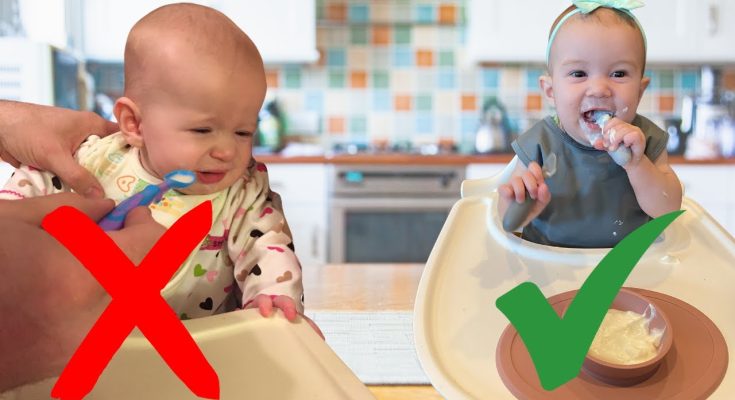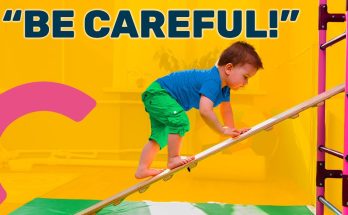Spoon-feeding is a common method many parents use to introduce solid foods to their babies. However, while it seems convenient and ensures the baby eats a sufficient amount, it may not be the best approach in the long run. Research and experts now suggest that allowing babies to self-feed fosters independence, improves motor skills, and encourages healthier eating habits. Instead of spoon-feeding, parents should consider baby-led weaning (BLW) and other self-feeding strategies. This article explores why you should stop spoon-feeding your baby and what you should do instead.
The Drawbacks of Spoon-Feeding
1. Delays Development of Motor Skills
When parents spoon-feed their baby, the child does not get a chance to practice grasping, holding, or maneuvering food into their mouth. These are essential skills that help develop fine motor coordination. In contrast, self-feeding allows babies to strengthen their hand-eye coordination and pincer grasp, preparing them for future tasks like writing and dressing.
2. Reduces Appetite Awareness
Babies are naturally capable of self-regulating their hunger and fullness. Spoon-feeding can interfere with this innate ability because parents often encourage their baby to finish a certain portion rather than letting them eat according to their hunger cues. This can lead to overeating habits and may contribute to obesity later in life.
3. Creates Mealtime Battles
Forcing or coaxing a baby to eat more than they want can turn mealtime into a stressful experience. Some babies may resist being spoon-fed, leading to power struggles that make eating less enjoyable. Allowing them to self-feed reduces pressure and makes mealtimes more relaxed and enjoyable for both the baby and the parent.
4. Limits Food Exploration
Spoon-fed babies often receive purees, which limit their exposure to different textures and shapes of food. Self-feeding encourages babies to explore various textures, colors, and flavors, making them more receptive to trying new foods as they grow older.
What to Do Instead
Instead of spoon-feeding, consider baby-led weaning or a combination approach that encourages self-feeding. Here’s how you can transition your baby to self-feeding:
1. Try Baby-Led Weaning (BLW)
Baby-led weaning is an approach that lets babies feed themselves from the start of solid food introduction, usually around six months. Parents offer soft, appropriately sized pieces of food, allowing the baby to grasp and eat independently. Some great first foods for BLW include:
- Soft-cooked carrot sticks
- Ripe avocado slices
- Banana pieces
- Steamed broccoli florets
- Strips of soft-cooked chicken
This method allows babies to eat at their own pace and explore food in a natural way.
2. Offer Finger Foods Early
If you’re not ready to go fully into BLW, you can still encourage self-feeding by incorporating finger foods alongside spoon-fed meals. Provide small, soft foods that your baby can pick up and eat themselves. This allows them to practice self-feeding while still receiving spoon-fed meals when necessary.
3. Encourage the Use of Utensils
Introduce baby-friendly spoons and forks early on. Even if they struggle initially, allowing them to hold and attempt to use utensils helps build coordination and self-feeding skills. Choose utensils with easy-grip handles designed for small hands.
4. Be Patient and Embrace the Mess
Self-feeding is messy, and that’s okay! Babies learn by exploring, so expect food to end up on their face, hands, and high chair. Instead of worrying about the mess, focus on the learning experience. Use bibs, place a mat under the high chair, and let your baby enjoy the process.
5. Model Good Eating Habits
Babies learn by watching their parents. Eat together as a family and show them how you chew and enjoy different foods. This encourages them to mimic your actions and be more interested in trying new foods.
6. Offer a Variety of Foods
Expose your baby to different flavors and textures early on. Instead of sticking to the same purees, offer a mix of soft and slightly firmer foods that they can hold and chew. Variety helps develop their taste preferences and prevents picky eating habits.
Common Concerns About Self-Feeding
1. Choking Risks
Many parents worry about choking when allowing their baby to self-feed. However, as long as foods are prepared safely—soft, appropriately sized, and easy to chew—the risk is minimal. Always supervise mealtimes and avoid choking hazards like whole grapes, nuts, and hard raw vegetables.
2. Nutrient Intake
Some parents fear their baby won’t get enough nutrition if they self-feed. The key is to offer a balanced variety of foods, including proteins, healthy fats, and carbohydrates. Breast milk or formula should still be the primary source of nutrition until about 12 months, so there’s no need to worry if your baby doesn’t eat large amounts of solid food initially.
3. Mess and Waste
Self-feeding can be messy, but it’s an important part of learning. Using a high-chair tray, placing a bib on your baby, and keeping a damp cloth nearby can help manage the mess. Over time, your baby will become more skilled at eating, and the mess will naturally decrease.
Conclusion
While spoon-feeding may seem like the easiest way to ensure your baby eats enough, it can hinder their ability to develop essential self-feeding skills. Transitioning to baby-led weaning or a self-feeding approach promotes independence, improves motor coordination, and encourages healthy eating habits. By offering a variety of safe, nutritious foods and allowing your baby to explore at their own pace, you set the foundation for a positive relationship with food that will benefit them throughout their life. So, put down the spoon, embrace the mess, and let your baby take the lead!



